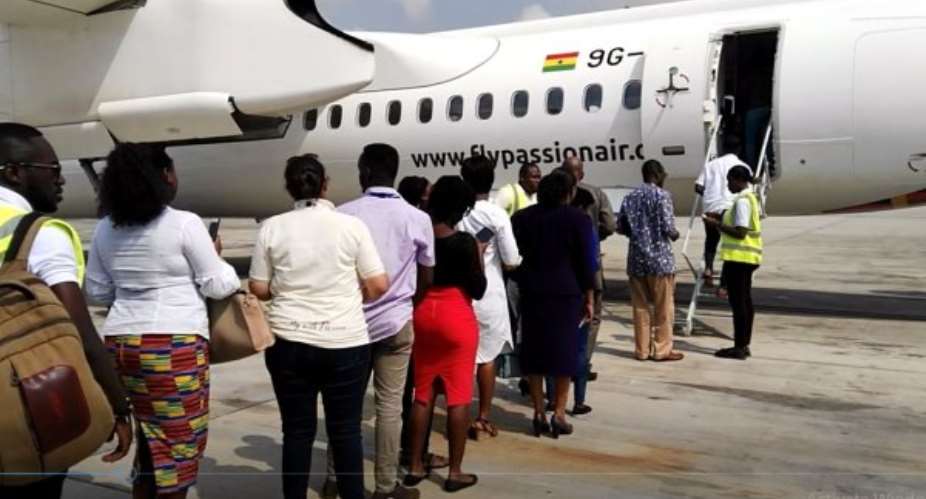The economic recovery of domestic airline operators after the easing of restrictions on movement is being slowed by a surge in prices of jet fuel.
Information pieced together by the Ghana News Agency indicates that Jet A-1 (one of the most commonly used fuels for commercial aviation) which was trading at an average $0.6 per litre on the local market in January this year, had shot up to an average $1.14 per litre by the third quarter of the year.
Analysts have blamed the skyrocketing prices on the impact of the Russia-Ukraine war on the global oil market, inflation, and the depreciation of the cedi against the US Dollar.
In order to sustain their operations, domestic airline operators have introduced a fuel surcharge ranging from GHS 22 to GHS 25 (depending on the fuel consumption rate of the aircraft used by the operator) per ticket.
However, passengers who do a round trip are required to pay a fuel surcharge ranging from GHS 44 and GHS 50 per ticket – and the amount is part of the total price build-up of the airfare.
The GNA has gathered that the amount is deducted and given to the jet fuel suppliers to help reduce the burden on the airline operators, whose expenditure on fuel had doubled since the beginning of the year.
The operators indicate that apart from the fuel surcharge introduced in March this year, they have not adjusted their original airfares since the beginning of the year for fear that patronage of their services could plummet if they did so.
In an interview with the GNA, Mr Duncan Sambu, the Chief Operating Officer, PassionAir, said the company now spends twice the amount of money it spent on fuel in the beginning of the year.
He said the situation had disrupted the growth plan of the company, adding that it was compelled to suspend its operations in Ho recently because of the skyrocketing prices of jet fuel.
“Our fare is in cedis. Most of our costs as an airline are in dollars. Even paying the Civil Aviation Authority charges in dollars and we pay based on the current forex rate,” he said.
“...We had to pass some of the cost to the passengers. We had to come up with a fuel surcharge which transfers part of the cost to the passengers which directly goes to the fuel companies,” he added.
Mr Sambu said local airline operators were under serious economic strain and that they would be compelled to adjust their airfares “if it gets to a level we cannot take.”
“We are monitoring the situation and we have a limit we can take. But the income of the passengers has not increased so we are also trying to look at how it is going to affect our passengers and we are also looking at the limit which we can sustain this,” he said.
He appealed to the Government to introduce a subsidy scheme in the short term to cushion the operators until prices of aviation fuel stabilised.
Dr Issaka Yakubu Akparibu, an aviation expert, told the GNA that the rising cost of jet fuel could result in a sharp rise in airfares if the situation on the global market persisted.
He urged the Government to pay critical attention to the plight of the local operators by reducing the taxes on petroleum products.
“Airlines should explore other measures to reduce cost of operations. Sometimes the airlines are compelled to reduce their staff strength but that also means that jobs would be lost,” he said.
Jet fuel prices have shot up in the last weeks following a disruption of the global oil supply chain occasioned by Russia's invasion of Ukraine.
In New York for instance, the cost of the fuel rose about fourfold to just over $7.50 a gallon before dipping back to $5.30 last month.
The situation has not only led to a rise in airfares but also has implications on the cost of global shipping.
Last month, Amazon announced plans to impose its first “fuel and inflation surcharge” for sellers whose goods it stores and delivers.
Domestic airline operators in Nigeria on Monday, May 9, 2022 aborted their planned suspension of all domestic flights over what they described as “a fourfold increase” in jet fuel prices.
The operators said the price of jet fuel had jumped from 190 to 700 Nigerian naira per litre (from $0.45 to almost $1.70).
GNA





 Lay KPMG audit report on SML-GRA contract before Parliament – Isaac Adongo tells...
Lay KPMG audit report on SML-GRA contract before Parliament – Isaac Adongo tells...
 Supervisor remanded for stabbing businessman with broken bottle and screwdriver
Supervisor remanded for stabbing businessman with broken bottle and screwdriver
 NDC watching EC and NPP closely on Returning Officer recruitment — Omane Boamah
NDC watching EC and NPP closely on Returning Officer recruitment — Omane Boamah
 Your decision to contest for president again is pathetic – Annoh-Dompreh blasts ...
Your decision to contest for president again is pathetic – Annoh-Dompreh blasts ...
 Election 2024: Security agencies ready to keep peace and secure the country — IG...
Election 2024: Security agencies ready to keep peace and secure the country — IG...
 People no longer place value in public basic schools; new uniforms, painting wil...
People no longer place value in public basic schools; new uniforms, painting wil...
 'Comedian' Paul Adom Otchere needs help – Sulemana Braimah
'Comedian' Paul Adom Otchere needs help – Sulemana Braimah
 Ejisu by-election: Only 33% of voters can be swayed by inducement — Global InfoA...
Ejisu by-election: Only 33% of voters can be swayed by inducement — Global InfoA...
 Minority will expose the beneficial owners of SML, recover funds paid to company...
Minority will expose the beneficial owners of SML, recover funds paid to company...
 Prof. Opoku-Agyemang has ‘decapitated’ the NPP’s strategies; don’t take them ser...
Prof. Opoku-Agyemang has ‘decapitated’ the NPP’s strategies; don’t take them ser...
